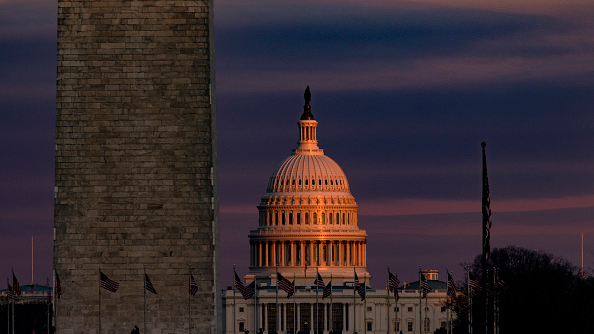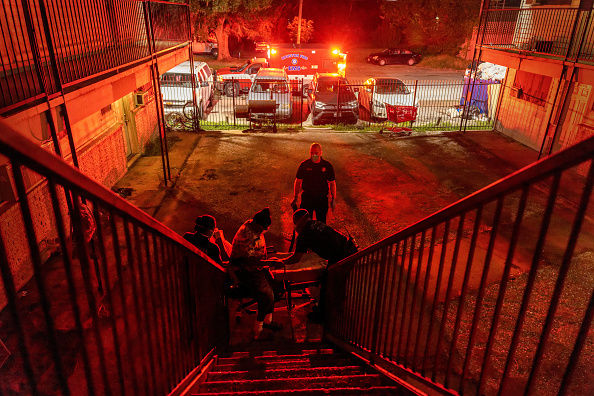
The U.S. Capitol building is seen past the Washington Monument as the sun sets, December 26, 2020. /Getty
The U.S. Capitol building is seen past the Washington Monument as the sun sets, December 26, 2020. /Getty
Editor's note: Danny Haiphong is an independent journalist and researcher in the United States. He is a contributing editor to the Black Agenda Report, co-editor of Friends of Socialist China and founding member of the No Cold War international campaign. The article reflects the author's opinions and not necessarily the views of CGTN.
U.S. President Joe Biden will hold the "Summit for Democracy" beginning on December 9. According to the U.S. Department of State, the summit will "provide a platform for leaders to make both individual and collective commitments to defend democracy and human rights at home and abroad." Concrete details of the civil society organizations, government institutions, and representatives of the private sector invited to the summit have yet to be announced. President Biden has asserted that the summit is one step in a long-term process of "democratic renewal."
The summit, far from an example of "renewal," reinforces the worldview that the United States possesses a monopoly on democracy. It begins from the vantage point that the United States is positioned to teach others about the perils of "authoritarianism." Democracy is rendered abstract; a lofty goal that is achievable only when the United States is the force leading the effort. Terms such as transparency, corruption, and human rights are used to draw a sharp contrast between U.S.-style democracy and other forms of governance that fail to conform to its standards.
However, the United States is in no position to lecture the world about democracy. Democratic governance in the United States faces several crises of confidence. First, the United States' political system has been unable to adequately address the COVID-19 pandemic. The COVID-19 pandemic was politicized in the United States from the outset, with neither major party in Washington being able to take responsibility in charting a truly national response to the public health crisis. Such political turmoil has led to more than 735,000 U.S.-based deaths from COVID-19 and counting.
The politicization of COVID-19 has only exacerbated a deeper crisis in U.S. "democracy." A growing number of people in the United States have lost trust in the political process. According to Pew Research Center, a mere 20 percent of people in the United States trust the federal government to "do the right thing" most or all of the time. Media institutions in the United States are also suffering from declining trust. Although the United States champions "free speech" as a key pillar of democracy, less than half of U.S. population trusts traditional media such as the New York Times or CNN.

Houston Fire Department EMS medics transport a COVID-19 positive patient to a hospital in Houston, Texas, August 20, 2021. /Getty
Houston Fire Department EMS medics transport a COVID-19 positive patient to a hospital in Houston, Texas, August 20, 2021. /Getty
The distrust in U.S. media and political institutions reflects a major limitation of U.S. democracy. U.S. democracy emphasizes abstract values over concrete improvements to society. U.S. institutions and leaders frequently boast of the inherent superiority of their democracy but rarely articulate how democratic values apply to the problems confronting the people. People in crisis seek out, and often times demand, change. During the global economic crisis of 2008, millions of U.S. workers placed their hopes in the incoming Barack Obama administration to provide redress for spikes in unemployment and home foreclosure. Instead, financial institutions on Wall Street were given large bailouts that helped them continue the same speculative practices that led to the economic crisis in the first place.
The U.S. tendency to render democracy abstract is no accident. All systems of governance possess a definite social character no matter how much this fact is avoided by mainstream U.S. institutions. U.S. democracy is not a democracy of the whole people. It is more accurately characterized as a democracy of the wealthy, by the wealthy, and for the wealthy. This fundamental contradiction requires the widespread dissemination of American exceptionalism – the ideology which presumes that the U.S. system of governance is superior to all others regardless of its historic and current problems.
American exceptionalism effectively reinforces the U.S.'s hegemonic ambitions. China and other countries targeted by U.S. hostilities are labeled "authoritarian" in an attempt to verify the so-called exceptional character of U.S. democracy. The contrast serves two purposes. U.S. elites escape accountability by projecting the shortcomings of their own system onto other nations. Furthermore, the depiction of China and other countries as "bad" or "evil" allows the U.S. foreign policy establishment to exploit racial animus in service of increased military aggression.
U.S. "democracy" has lost significant prestige over the past several decades. The world looks upon the U.S. persecution of Julian Assange, the U.S.-led expansion of destructive wars, and the massive racial and economic inequality afflicting U.S. society as deeply incongruent with the needs of humanity in this moment of global crisis. Democracy is not a one-size fits all model. China, and indeed all nations, has the right to pursue its own political and economic models of democracy free from external interference. The Biden administration's "Summit on Democracy" is unlikely to address these issues and is just another opportunity for the U.S. to dress up its dangerous "America First" approach to politics in the garb of democracy.
(If you want to contribute and have specific expertise, please contact us at opinions@cgtn.com.)

